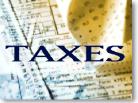|
Desperate for deductions?
|
 |
April 10, 1998: 12:25 p.m. ET
KPMG accountant gives some 11th-hour tips for write-off seekers
|
NEW YORK (CNNfn) - Small-business owners often find tax season to be a particularly stressful time, but Larry Foster, certified public accountant at KPMG Peat Marwick, offered some fundamental advice for organizing your records and finding that last possible deductible expense.
He also reminded investors about the new rules for capital gains tax.
Here is a transcript of his "Take It Personally" comments.
VALERIE MORRIS, CNNfn ANCHOR: Larry, let's start out with kind of a mindset. What should be the mindset of the small business owners as they approach the tax season?
LAURENCE FOSTER, CERTIFIED PUBLIC ACCOUNTANT, KPMG PEAT MARWICK: Well, one of the things is organization. I believe that if everybody sits down and goes through the records that they do keep -- or records they don't keep -- and just tries to organize the material in some way, you can get a tax deduction out of something that might not appear to be a tax deduction.
MORRIS: So, good record keeping throughout the year will help make this time of year less anxiety-ridden?
FOSTER: Very much easier.
MORRIS: All right. Let's talk a little bit about capital gains rules because that really is the big tax change this year.
FOSTER: That's correct. In 1997, we have the new basket approach to capital gains. We used to have just two situations, long term and short term. Now, we have long term, short term, and something called mid term.
And it depends when you sold the stock. From Jan. 1 to May 6, we're sitting with the old rules. From May 7 to July 28, we have these new rules partially in place and then from July 28 on, we've got the new rules in place completely. Beyond July 28, depending on whether you hold something for more than 12 months or more than 18 months, you will either get a 20 percent tax rate or 28 percent tax rate.
MORRIS: It seems with these changes that people might in fact need to consult a specialist in order to see their way through this properly.
FOSTER: It's gotten quite a bit complicated, more so than before, because you've got to separate all your transactions into these little buckets.
MORRIS: What about tips for right now? As people are looking at their small businesses and wanting to get all this tax stuff done in time and meet deadlines, what other tips besides organization do you offer?
FOSTER: Well, again, if you take a look at what you spend your money on, you find that some of the amounts that you have been paying can become a tax deduction. For instance, look at your utilities, look at your costs of cleaning -- things that you might not consider a business expense could become a business expense when you work at home.
MORRIS: There are some things about this whole situation with regard to the home office as the primary office space. It seems like it's [just] semantics, but it really is very specific. Give us the details on that.
FOSTER: Well, under the current rules -- and they will be changing beginning with 1999 -- if your primary place of business is not your home, you cannot use your office at home as a tax-deductible office. Beginning with 1999, that rule is changing. People who will be working out of the home but spending most of the time out of the home will be able to get a deduction for a home office as well.
MORRIS: Are there red flags that are waved if you do certain things with your small business that might make the IRS pay more attention to you than you want it to?
FOSTER: Well, when you prepare your Schedule C, they lay out various deductions for you. If you tend to pick those deductions and put them down the way they describe them -- advertising, entertainment -- and use their form as opposed to creating another category of a deduction that someone has to look at and think about, [you're better off]. 
|
|
|
|
|
 |

|

